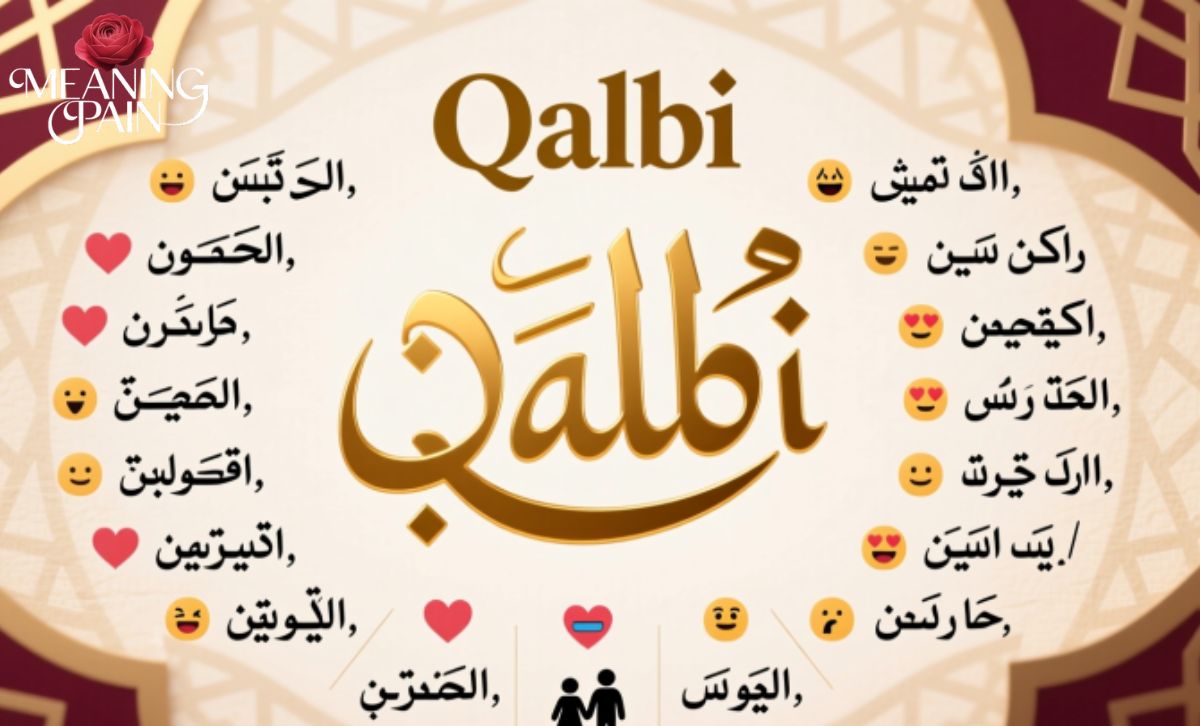The word “Qalbi” (قلبي) is a lovely and emotional Arabic word that means “my heart.” It is often used to show love, affection, and deep care for someone special. This single word holds a powerful emotional connection in Arabic culture.
People use “Qalbi” in daily conversations to express closeness, much like saying “my dear” or “my love” in English. It’s a simple word, but it carries warmth and sincerity.
What Does “Qalbi” Mean in Arabic?
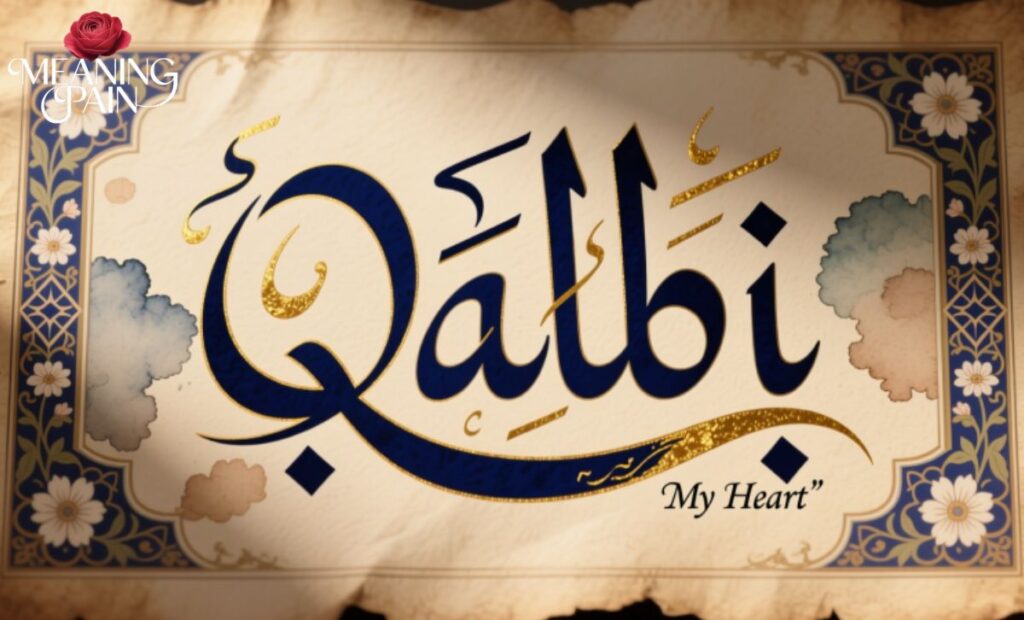
- Heart (قلب) – The physical and emotional organ; center of feelings
- Al-Qalb = The heart
- My (ي) – Possessive pronoun indicating ownership
- Ya’ = My/mine
- Affection (محبة) – Deep emotional attachment and love
- Mahabbah = Affection/love
- Soul (روح) – The spiritual essence within a person
- Ruh = Soul/spirit
- Love (حب) – Intense feeling of deep affection
- Hubb = Love
- Emotion (عاطفة) – Strong feelings from the heart
- ‘Atifah = Emotion
- Beloved (حبيب) – Someone deeply loved and cherished
- Habib = Beloved/darling
- Feelings (مشاعر) – Internal emotional experiences
- Masha’ir = Feelings
- Passion (شغف) – Intense enthusiasm or desire
- Shaghaf = Passion
- Longing (شوق) – Deep yearning for someone/something
- Shawq = Longing/yearning
The Literal and Emotional Meaning of “Qalbi”
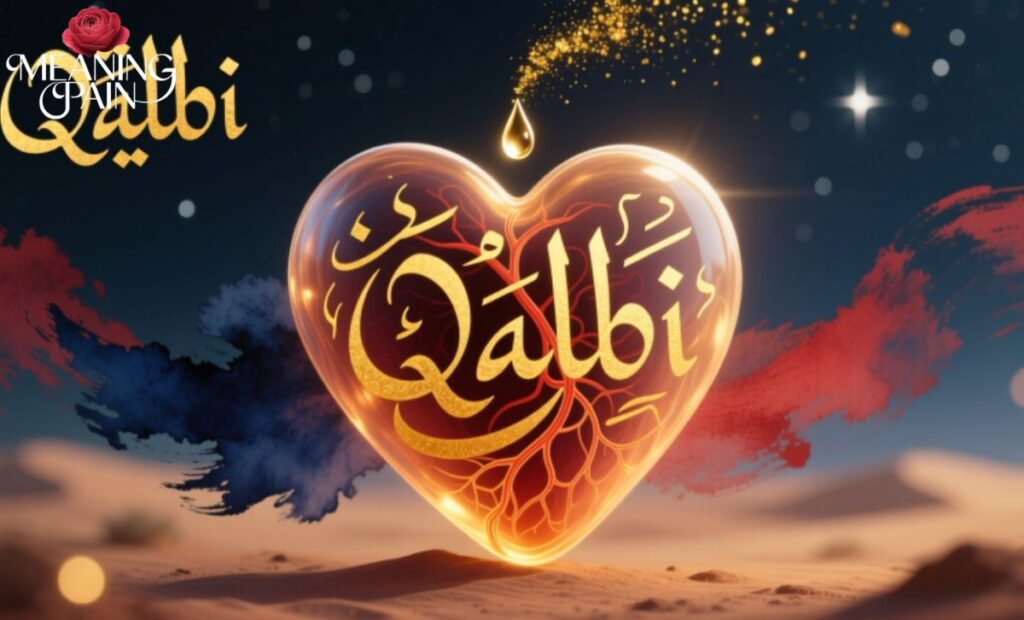
- Literal (حرفي) – The exact, direct meaning
- Harfi = Literal
- Metaphorical (مجازي) – Symbolic or figurative meaning
- Majazi = Metaphorical
- Possession (ملكية) – Ownership or belonging to someone
- Milkiyyah = Possession
- Core (جوهر) – The central or most important part
- Jawhar = Core/essence
- Center (مركز) – The middle point; focal area
- Markaz = Center
- Emotional (عاطفي) – Related to feelings and sentiments
- ‘Atifi = Emotional
- Sincerity (إخلاص) – Genuine, heartfelt authenticity
- Ikhlas = Sincerity
- Attachment (تعلق) – Emotional connection to someone
- Ta’alluq = Attachment
- Intimacy (حميمية) – Close personal relationship
- Hamimiyyah = Intimacy
- Endearment (حنان) – Expression of affection and tenderness
- Hanan = Tenderness/endearment
The Linguistic Root of the Word “Qalbi” (قَلْبِي)
- Root (جذر) – The original base form of a word
- Jidhr = Root
- Trilateral (ثلاثي) – Three-letter root system in Arabic
- Thulathi = Trilateral
- Q-L-B (ق-ل-ب) – The three-letter root of “qalb”
- Qaf-Lam-Ba’ = Q-L-B
- Derivative (مشتق) – Word formed from a root
- Mushtaq = Derivative
- Morphology (صرف) – Study of word formation
- Sarf = Morphology
- Grammar (نحو) – Structure and rules of language
- Nahw = Grammar
- Suffix (لاحقة) – Letter(s) added at word’s end
- Lahiqah = Suffix
- Pronoun (ضمير) – Word replacing a noun (like “my”)
- Damir = Pronoun
- Possessive (إضافي) – Showing ownership or belonging
- Idafi = Possessive
- Etymology (علم أصل الكلمات) – Study of word origins
- ‘Ilm Asl al-Kalimat = Etymology
- Transformation (تحويل) – How words change forms
- Tahwil = Transformation
- Pattern (وزن) – Template for Arabic word forms
- Wazn = Pattern/weight
- Conjugation (تصريف) – Changing word forms systematically
- Tasrif = Conjugation
- Semantic (دلالي) – Related to meaning
- Dalali = Semantic
- Vowel (حركة) – Short sounds marking pronunciation
- Harakah = Vowel/movement
How “Qalbi” Is Used in Daily Arabic Conversation
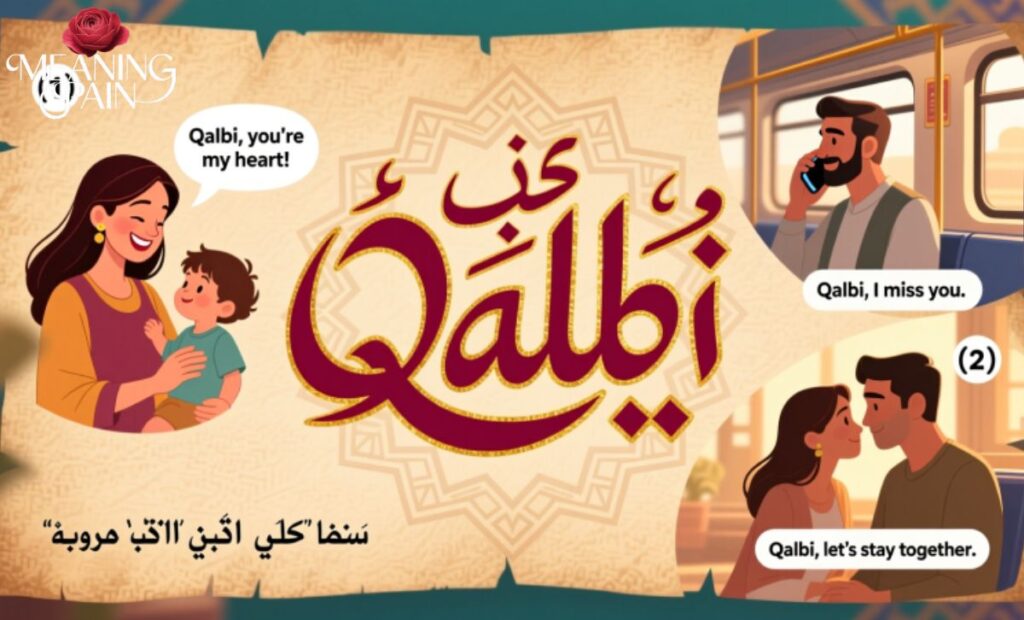
- Expression (تعبير) – Way of communicating thoughts/feelings
- Ta’bir = Expression
- Darling (حبيبي) – Term of endearment for loved ones
- Habibi = My darling
- Poetry (شعر) – Artistic literary expression in verse
- Shi’r = Poetry
- Song (أغنية) – Musical composition with lyrics
- Ughniyah = Song
- Conversation (محادثة) – Informal spoken exchange
- Muhадatha = Conversation
- Romantic (رومانسي) – Related to love and affection
- Romansi = Romantic
- Phrase (عبارة) – Group of words expressing an idea
- ‘Ibarah = Phrase
- Colloquial (عامي) – Informal, everyday language style
- ‘Ammi = Colloquial
- Dialect (لهجة) – Regional variation of language
- Lahjah = Dialect
- Endearing (محبب) – Inspiring affection or fondness
- Muhabbab = Endearing
- Greeting (تحية) – Expression of welcome or recognition
- Tahiyyah = Greeting
- Compliment (مجاملة) – Expression of praise or admiration
- Mujamalah = Compliment
- Context (سياق) – Circumstances surrounding word usage
- Siyaq = Context
- Intimacy (ألفة) – Close familiarity and warmth
- Ulfah = Intimacy/familiarity
- Genuine (صادق) – Authentic and truly meant
- Sadiq = Genuine/truthful
Arabic Grammar Behind “Qalbi” – Possessive Form Explained
- Possessive (ملكية) – Indicating ownership or belonging
- Milkiyyah = Possessive/ownership
- Pronoun (ضمير) – Word substituting for a noun
- Damir = Pronoun
- Attached (متصل) – Connected directly to another word
- Muttasil = Attached/connected
- Construction (تركيب) – How words are structured together
- Tarkib = Construction/structure
- Genitive (مضاف إليه) – Grammatical case showing possession
- Mudaf Ilayhi = Genitive/possessed
- Addition (إضافة) – Grammatical construction linking words
- Idafah = Addition/annexation
- Noun (اسم) – Word identifying person, place, or thing
- Ism = Noun/name
- Declension (إعراب) – Word ending changes by grammatical role
- I’rab = Declension/parsing
- Case (حالة) – Grammatical category affecting word form
- Halah = Case/state
- Structure (بنية) – Organization and arrangement of elements
- Binyah = Structure
- Syntax (تركيب نحوي) – Rules governing sentence construction
- Tarkib Nahwi = Syntax
- Agreement (مطابقة) – Grammatical matching between words
- Mutabaqah = Agreement/conformity
- First-person (المتكلم) – Speaker referring to themselves
- Al-Mutakallim = The speaker
Examples of “Qalbi” in Arabic Sentences
- Sentence (جملة) – Complete grammatical unit expressing thought
- Jumlah = Sentence
- Example (مثال) – Illustrative instance showing usage
- Mithal = Example
- Context (سياق) – Surrounding circumstances affecting meaning
- Siyaq = Context
- Usage (استخدام) – How a word is employed
- Istikhdам = Usage/use
- Translation (ترجمة) – Converting text between languages
- Tarjamah = Translation
- Meaning (معنى) – Significance or message conveyed
- Ma’na = Meaning
- Verb (فعل) – Word expressing action or state
- Fi’l = Verb/action
- Subject (فاعل) – Person/thing performing the action
- Fa’il = Subject/doer
- Object (مفعول به) – Person/thing receiving the action
- Maf’ul Bihi = Object
- Preposition (حرف جر) – Word showing relationship between words
- Harf Jarr = Preposition
- Phrase (عبارة) – Group of words forming unit
- ‘Ibarah = Phrase/expression
- Predicate (خبر) – Part of sentence stating something
- Khabar = Predicate/news
- Conjunction (حرف عطف) – Word connecting clauses or sentences
- Harf ‘Atf = Conjunction
Quranic and Cultural Significance of “Qalbi”
- Quran (قرآن) – Holy book of Islam
- Qur’an = Quran/recitation
- Verse (آية) – Single sentence or passage in Quran
- Ayah = Verse/sign
- Sacred (مقدس) – Holy and religiously significant
- Muqaddas = Sacred/holy
- Spiritual (روحاني) – Related to the soul and spirit
- Ruhani = Spiritual
- Faith (إيمان) – Deep religious belief and trust
- Iman = Faith/belief
- Worship (عبادة) – Acts of religious devotion
- ‘Ibadah = Worship
- Prayer (دعاء) – Communication with God
- Du’a = Prayer/supplication
- Tradition (تقليد) – Cultural practices passed down
- Taqlid = Tradition
- Culture (ثقافة) – Shared customs and beliefs of group
- Thaqafah = Culture
- Heritage (تراث) – Valued traditions from the past
- Turath = Heritage
- Literature (أدب) – Written artistic works
- Adab = Literature/manners
- Proverb (مثل) – Traditional saying expressing wisdom
- Mathal = Proverb
- Symbol (رمز) – Object representing something else
- Ramz = Symbol
- Metaphor (استعارة) – Figurative comparison without “like”
- Isti’arah = Metaphor
Common Mistakes and Misunderstandings About “Qalbi”
- Mistake (خطأ) – Error or incorrect action
- Khata’ = Mistake/error
- Pronunciation (نطق) – Way of speaking a word
- Nutq = Pronunciation
- Spelling (إملاء) – Correct letter arrangement
- Imla’ = Spelling/dictation
- Confusion (ارتباك) – State of being unclear or mixed up
- Irtibak = Confusion
- Misinterpretation (سوء فهم) – Incorrect understanding of meaning
- Su’ Fahm = Misunderstanding
- Accent (لكنة) – Distinctive pronunciation pattern
- Laknah = Accent
- Gender (جنس) – Masculine or feminine classification
- Jins = Gender/type
- Plural (جمع) – Form indicating more than one
- Jam’ = Plural/gathering
- Singular (مفرد) – Form indicating only one
- Mufrad = Singular
- Correction (تصحيح) – Making something right or accurate
- Tashih = Correction
“Qalbi” vs. “Habibi” – What’s the Difference?
- Difference (فرق) – Distinction or contrast between things
- Farq = Difference
- Comparison (مقارنة) – Examining similarities and differences
- Muqaranah = Comparison
- Habibi (حبيبي) – My beloved or my darling
- Habibi = My beloved
- Beloved (حبيب) – Someone deeply loved
- Habib = Beloved/lover
- Endearment (تحبب) – Expression showing affection
- Tahabbub = Endearment
- Term (مصطلح) – Specific word or expression
- Mustalah = Term
- Distinction (تمييز) – Recognition of differences
- Tamyiz = Distinction
- Usage (استعمال) – Practical application of words
- Isti’mal = Usage
- Interchangeable (قابل للتبديل) – Can be substituted for each other
- Qabil lil-Tabdil = Interchangeable
- Context (سياق) – Situation determining word choice
- Siyaq = Context
- Nuance (فارق دقيق) – Subtle shade of meaning
- Fariq Daqiq = Subtle difference
- Appropriate (مناسب) – Suitable for the situation
- Munasib = Appropriate
The Spectrum of Love Words in Arabic
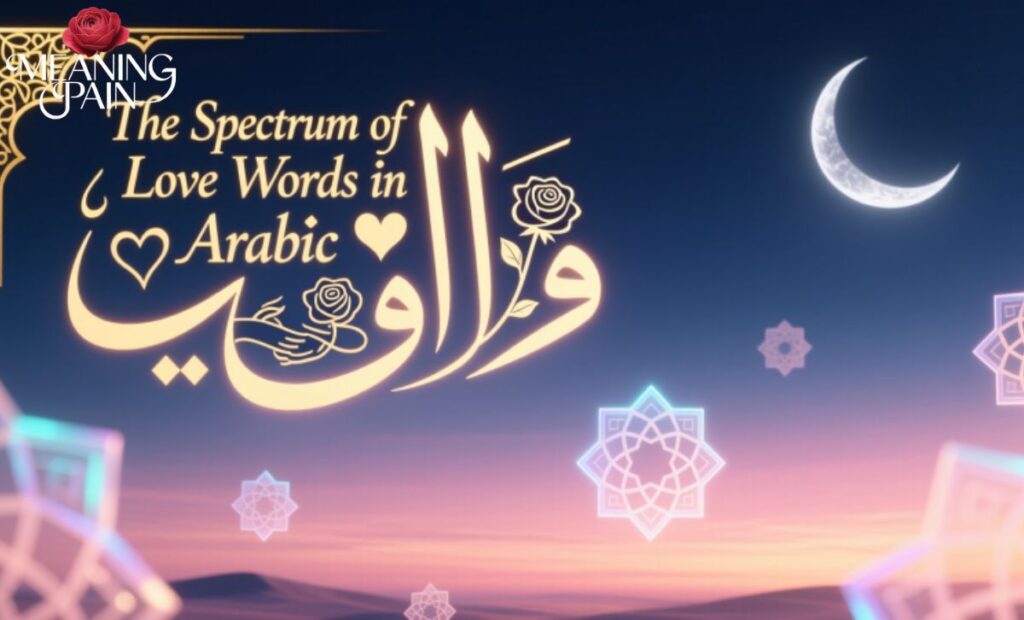
- Spectrum (طيف) – Range or complete variety
- Tayf = Spectrum
- Variety (تنوع) – Different types or forms
- Tanawwu’ = Variety/diversity
- Intensity (شدة) – Degree or level of strength
- Shiddah = Intensity
- Adoration (عشق) – Deep worship-like love
- ‘Ishq = Passionate love/adoration
- Infatuation (افتتان) – Intense but short-lived passion
- Iftitan = Infatuation
- Devotion (ولاء) – Loyal commitment and dedication
- Wala’ = Devotion/loyalty
- Romance (غرام) – Passionate romantic attraction
- Gharam = Romance/passionate love
- Tenderness (رقة) – Gentle, soft affection
- Riqqah = Tenderness/gentleness
- Compassion (رأفة) – Sympathetic concern and care
- Ra’fah = Compassion
- Cherish (يعتز) – To treasure and hold dear
- Ya’tazz = To cherish/value
- Treasure (كنز) – Something highly valued
- Kanz = Treasure
- Desire (رغبة) – Strong wish or longing
- Raghbah = Desire/wish
- Yearning (حنين) – Deep nostalgic longing
- Hanin = Yearning/nostalgia
Sweet Arabic Words of Affection for Him & Her
- Sweet (حلو) – Pleasant and endearing
- Hilw = Sweet
- Affection (حنان) – Gentle loving care
- Hanan = Affection/tenderness
- Sweetheart (حبيبة) – Term for female beloved
- Habibah = Female beloved
- Darling (عزيزي) – Dearly loved person
- ‘Azizi = My dear (masculine)
- Precious (غالي) – Extremely valuable and loved
- Ghali = Precious/expensive
- Life (حياتي) – “My life” as endearment
- Hayati = My life
- Eyes (عيوني) – “My eyes” showing importance
- ‘Uyuni = My eyes
- Soul (روحي) – “My soul” expressing deep connection
- Ruhi = My soul
- Light (نور) – Brightness symbolizing joy
- Nur = Light
- Moon (قمر) – Symbol of beauty
- Qamar = Moon
- Honey (عسل) – Sweet term of endearment
- ‘Asal = Honey
- Angel (ملاك) – Pure and beautiful being
- Malak = Angel
- Flower (وردة) – Symbol of beauty and delicacy
- Wardah = Flower/rose
Famous Arabic Quotes and Poetry About Love and Heart
- Quote (اقتباس) – Repeated words from someone
- Iqtibas = Quote/citation
- Poetry (شعر) – Artistic literary composition
- Shi’r = Poetry
- Poet (شاعر) – Person who writes poetry
- Sha’ir = Poet
- Verse (بيت) – Single line of poetry
- Bayt = Verse/house
- Classical (كلاسيكي) – Traditional and time-honored
- Klasiki = Classical
- Modern (حديث) – Contemporary and current
- Hadith = Modern/new
- Romantic (عاطفي) – Related to love and emotion
- ‘Atifi = Emotional/romantic
- Eloquent (فصيح) – Fluent and persuasive expression
- Fasih = Eloquent/articulate
- Wisdom (حكمة) – Deep understanding and insight
- Hikmah = Wisdom
- Expression (تعبير) – Conveying thoughts or feelings
- Ta’bir = Expression
- Metaphor (تشبيه) – Figurative comparison
- Tashbih = Simile/metaphor
- Beauty (جمال) – Quality of being pleasing
- Jamal = Beauty
Frequently Asked Questions
What does Qalbi mean in Arabic?
Qalbi means “my heart” in Arabic. It’s a loving term used to show deep affection and closeness.
What do Arabs call their lover?
Arabs often use words like Habibi (my love) for a male and Habibti (my love) for a female.
What can I call my wife in Arabic?
You can call your wife Habibti (my love), Hayati (my life), or Amirati (my princess).
What does Hayati Qalbi mean?
Hayati Qalbi means “my life, my heart.” It’s a very romantic and emotional phrase.
What does Anta Qalbi mean?
Anta Qalbi means “you are my heart” in Arabic. It’s often said to express deep love.
Conclusion
The word “Qalbi” (قلبي) holds a deep emotional meaning in Arabic. It simply means “my heart,” but it carries feelings of love, care, and closeness. People use it to express true affection and connection with someone special.
In Arabic culture, “Qalbi” is not just a word — it’s a warm expression of the heart. When someone says “Ya Qalbi,” it shows pure love and tenderness. It’s one of the most heartfelt ways to show emotion.

James Dean was an American actor and cultural icon of teenage rebellion, best known for Rebel Without a Cause, Giant, and East of Eden.
